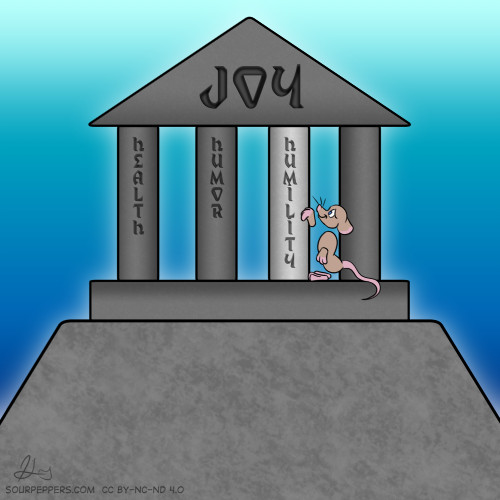I've given a lot of thought in recent years to how I should go about building a happy and satisfying life for myself. There are a thousand and one rules I could codify and memorize, each one carefully calculated to bring happiness or avoid pain. But any system like that would be very fragile; a change in circumstance or new knowledge could cause the entire code to become invalid. I could instead just go with the flow and do whatever feels right at the time, trusting my intuition to guide me. But I know from experience that, in spite of my best intentions, I am liable to make snap judgements or forget important information, leading to suboptimal outcomes.
Joy
The roof represents joy. I believe that the ultimate purpose of our existence is to find true and lasting joy (see 2 Nephi 2:25). Just as every other part of the building supports the roof, everything I do in my life should bring me closer to this goal.
Joy is not merely pleasure, which is fleeting and often leaves one feeling dissatisfied and wanting more. Nor is it only happiness, which is only one piece of what joy truly is. To me, joy is a sense of completeness, an eager anticipation for the eventual resolution of all of life's ills, and a sure confidence that it will come. One can feel happy without experiencing true joy if they lack the confidence that their happiness will last. Yet one can feel joy even while experiencing pain, because they know the pain won't last, and may even be for their eventual good.
The roof is pointed, leading one's gaze upward. It's a reminder that we should always be looking forward and striving for progress, both in ourselves and in the world around us.
The roof is supported by four pillars. Each one represents a principle that supports the goal of finding true and lasting joy. A weakness in any one of the four pillars can cause strain on the others. But when care is given to strengthening all four, our search for joy becomes a more confident one, and one that will bring great satisfaction along the journey as well.
Health
The first pillar represents health, specifically, physical health. Our mortal bodies are temporary; all will one day pass through the veil of death. But they are also a gift. Our bodies allow us to experience the entire spectrum of pleasurable physical sensations. Our bodies allow us to work and affect positive changes in the world around us. However, when we are not physically healthy, we experience pain of a variety that demands our attention and drains our energy. Experiencing pleasure and avoiding pain are not the end goals of our existence, and frequently these two driving instincts conflict with higher goals. But whenever possible (and it nearly always is), we should strive to take care of our physical health, as it will enable us to do much good for ourselves as well as for others.
As I've started to venture into what some call "middle age," I've found it to be even more important to pay diligent heed to how I care for my body. I have tried a number of things, from diets and supplements to exercise programs and sleeping tips. Some have worked, and I've done my best to hold on to them. Others either didn't yield the desired results or weren't sustainable. But even from the latter group, I've usually gained some useful insight. I've included more specific details about how I care for my physical health as an appendix at the end of this post.
When I am physically well, I am better able to do the work that needs to be done, to help others, and to focus on other important things in life. Physical health is also closely related to emotional health; when I take care of my body, it is easier to feel happy and I recover more quickly from emotional pain.
Humor
When I say humor, I don't only mean a good "sense of humor," but rather being in good spirits generally. In other words, if the first pillar represents physical health, the second represents emotional and mental health. (While there may be subtle differences between the terms "emotional health" and "mental health", they are often used interchangeably, and for simplicity sake I use them to mean the same thing here.)
I've never been diagnosed with any mental health disorders, but I have recognized that I sometimes go through brief periods of anxiety or melancholy. I have also seen a therapist before. It was during a time of my life when I was having some emotional struggles. I learned a lot from that experience. Most people would not think twice about seeking a physician's advice about physical ailments. We should likewise not be afraid to seek professional help in maintaining our mental health.
I've learned the importance of allowing ourselves to feel things. Feelings such as anger, sadness, and fear are not inherently bad. While it's important to recognize the cause and appropriate responses to these emotions, actually feeling them, and allowing ourselves to feel and express them helps us develop the ability to process them in a healthy way.
I also keep my mind sharp by reading and listening to uplifting and edifying content, as well as wholesome entertainment. I try to be mindful of the effect such content has on me, as well as the merits of its source. I consume content from a variety of sources that share a variety of ideas, including those I may disagree with. I strive to remain teachable, and I have found value from a number of unexpected places.
Humility
To remain teachable, it's important to be humble. I've noticed a tendency of mine to immediately accept things that support my currently held beliefs and dismiss things that would seem to contradict them. I suspect that isn't unusual. But shouldn't we want to learn what's actually true instead of merely clinging to that which we already have, simply because it is familiar and comfortable? In order to learn, I constantly remind myself not only that I don't know everything, but that I don't know what I don't know. Something that may seem obvious and true to me now may not be quite right. But learning what those things are requires humility.
Learning through humility involves questioning my assumptions and seeking to understand perspectives other than my own. It doesn't mean I throw away the beliefs I already have. But it does mean considering the possibility that, for all my feelings of confidence and certainty, I might be wrong. And if I'm wrong, I'd rather know it than continue to live in ignorance.
I try to be skeptical any time I feel immediate certainty about the truthfulness or falsity of some new piece of information. Before accepting something as true or false, I try to learn more about it from multiple sources, including perspectives different from my own. Without exception, this has always resulted in deepening my understanding. Often I learn that the thing is more nuanced than it first appeared and that several of my assumptions were incorrect. Occasionally I'll come to the conclusion that my initial impressions were actually right, but going through the process was still valuable as it increased my confidence.
Humility also informs how I interact with others I disagree with, even after gaining a better understanding of their position. It takes humility to recognize that none of us can change another person's mind. If it is going to change, they will change it themselves. And even if they don't, we needn't walk away from each other as enemies. I favor persuasion over coercion; whomever I cannot persuade I will not attempt to coerce through physical force or emotional manipulation.
Humanity
We were not born alone on this earth, and no one can make it through this life completely on their own. All of us depend on each other. As important as it is to take care of ourselves, we must also be on the lookout for ways to help those around us. I strive to be generous with my time, talents, and resources, just as I've benefited from the generosity of others. Life is not a zero-sum game; someone else's gain is not my loss. Rather, I view the honest successes of others as my own success.
I believe in a society that is built around laws, but I also believe that those laws should serve the people, not the other way around. The laws of the land should make it easier for people to live in dignity, safety, and freedom. I believe that leaders of communities, nations, or any other group of people should consider themselves first and foremost servants of those they lead and that they should be held accountable for how they execute that sacred calling.
I don't believe in collecting enemies. I know I probably won't please everyone. But I would rather count someone as a friend who just doesn't know it rather than nurse a grudge against them. I don't ignore, excuse, or justify the bad actions of others. But I try to look for the good in them as well. I give others the benefit of the doubt that more often than not they are acting in good faith and trying to do what they understand to be right.
Agency
My quest for joy is upheld by the four pillars of health, humor, humility, and humanity. But each of those pillars in turn depends upon a foundation of agency. We are not fleshy automatons whose actions are determined purely by some incomprehensibly complex calculation that includes outer stimuli, inner chemistry, and random chance. While we may be influenced by these things, every person has a soul, and within that soul is the ability to choose.
To exercise agency means to be deliberate rather than reactionary. Without it, every one of the four pillars mentioned above would tumble to rubble. With it, they are strengthened and even built upon:
- Instead of reacting to hunger, pain, or fatigue by doing the easiest thing to relieve them, I act deliberately by choosing how to feed, exercise, and rest my body.
- Instead of reacting to my emotions by immediately following whatever actions they bring to mind, I act deliberately by acknowledging them, understanding them, and seeking healthy and constructive outlets for them.
- Instead of reacting to perceived attacks on my pride by stubbornly refusing to budge on any issue, I act deliberately by acknowledging my own lack of knowledge and trying to increase my understanding.
- Instead of reacting to my desires for self-fulfillment by building myself up at the expense of others, I act deliberately by putting others first and seeking ways to serve them better.
I believe that our choices matter. And the honest truth is, even if there were no inherent meaning to our lives or the universe, I would still choose to act like they matter. Because when we live as though our choices matter, we will make choices that ultimately make us and others happier.
But beyond simply living like our choices matter, I believe that our lives really do matter, which brings me to the final and by far most important piece.
Christ
I said I would choose to live as though life had meaning, even if it didn't. But I believe that it does have meaning, and that it does because of Christ. I know that I can't attain lasting joy without Him. Without Him as my rock and foundation, there would be no real agency upon which to base my actions, because ultimately there would either be no existence after this life, or else I would always be in debt to my mistakes as an imperfect and fallible being.
But because Christ lived, loved, taught, died, and rose again, everyone who has ever lived and who ever will live has the potential for a future glorious existence. There's nothing we need to do (nor can do) to earn it; it is already waiting for us after this life is done. All we need to do is accept His gift and learn how to live and love as He did.
Christ illuminates every aspect of my life. By following His perfect example and teachings, as well as those of His servants, I learn which areas of my life can be improved and where I can patch the cracks. And it is His Atonement, which is stronger than any physical building material, that makes building any life worth living even possible in the first place.
I know I won't live a perfect life. Try as I might, I will always fall short of the lofty expectations I have for myself and the glorious potential God sees in me. But I've come to peace with that fact. I can hold myself to high standards while being patient and forgiving to myself. When I do fall short, I won't beat myself up for it, but rather identify the weakness and do what I can to repair and mitigate it. These guiding principles I've developed for myself are simply a framework to help keep me focused on that goal.
I hope this has been helpful. I intend to refer back to this post for my own benefit from time to time and perhaps even adjust, simplify, or otherwise improve upon it. I would encourage everyone to consider what their own guiding principles are, whether or not they use any part of the principles mentioned here as a model. Life is richer when we live it with purpose.
Appendix 1: Physical Health
Sleep
Arguably the most important thing I do for my physical health is trying to get 7-8 hours of sleep each night. More specifically, I try to spend eight hours in bed each night which, after accounting for the amount of time it takes me to fall asleep and any potential times waking up in the middle of the night, usually puts me over seven hours of actual sleep. To help ensure high quality of sleep at night, I set my phone to turn down the intensity of blue light starting a couple hours before bed, and I try to not use any screens at all for at least a half hour before bed. I also try to get in at least a half hour of moderate to intense physical activity during the day (but not too close to bed time) as well as at least fifteen minutes of midday sunlight, when available, to help regulate my circadian rhythm.
When I'm well rested, not only to I just feel better in general, but it's also easier for me to eat better, I recover more quickly from soreness or injury, and I'm better able to regulate my emotions. Every once in a while (less than once per week) I'll allow myself a late night to have fun with friends or get some extra work done, but I do so very sparingly and almost never multiple nights in a row. I wasn't always as diligent, and would frequently sacrifice sleep in order to get more things done. But since I've started being more diligent setting healthy sleep habits, every other aspect of my physical and emotional health has markedly improved, as has my productivity and overall feeling of well-being.
When I have trouble sleeping, I treat it as seriously as I would any other physical ailment or illness and talk to a physician about it. I have even spoken with a sleep specialist who has given me more detailed and specific advice for getting better sleep.
Diet
Entire libraries could be filled with the varied dietary advice that exists in the world. What has worked the best for me is a set of basic guidelines. I'm not perfect at following them, but when I do, I notice a difference in how I feel, as well as an acceleration in physical goals, such as weight loss. These include having fruits and veggies with every meal, eating more whole grains and lean proteins, and limiting the amount of added sugars I consume each day to 24 grams or fewer. I am also getting into the habit of tracking what I eat, which gives me a clearer picture of what I'm putting into my body. I don't cut fats and sweets out of my diet entirely, but rather moderate them and strive to be more deliberate about the ones I eat instead of just eating something because it's available. Lastly, I allow myself one free day per week during which I can eat what I want. I call them "free days" instead of "cheat days" because I'm not cheating; I'm purposefully giving myself an opportunity to indulge. It gives me something to look forward to during the week, and I've noticed it doesn't slow my progress towards my physical goals that much when I limit it to just one day per week.
I do take dietary supplements, like multivitamins and fiber. But they are supplemental, not a replacement for healthy eating. I also drink plenty of water throughout the day, usually 8-9 glasses per day, or around 10-12 if I've been exercising a lot that day.
Exercise
As I mentioned earlier, I aim to get at least 30 minutes of moderate to intense exercise each day. I enjoy running, so I usually go for a run 3-4 days per week. On the days I don't run, I try to do some form of cross-training, which could be weight training, calisthenics, swimming, or yoga. I also go for a short walk most afternoons.
Light exercise is better than none. But I do try to push myself at least a couple times per week and work outside my comfort zone. When running, for example, I have a five-point scale in which 1 out of 5 is walking and 5 out of 5 is an all-out sprint. At least one run per week I include several short intervals at a 4-5 effort level, and another run I hold a 3.5-4 effort level for an extended period of time. These more difficult training sessions increase my body's strength and endurance. While it doesn't always feel good while doing them, I feel great after the workout is complete.
Finally, I give my body the recovery it needs after each workout. That includes stretching, eating a good meal, and even massaging, foam rolling, and Epsom salt baths to soothe sore muscles. If I sustain an injury, I give my body the time it needs to heal by changing my workout routine as needed.
Other
Other things I do to keep up my physical health include maintaining proper hygiene (including oral care), regular checkups with my doctor (not just when I'm feeling sick), staying up to date on any immunizations and medication, following safety guidelines appropriate to each given situation, and giving myself plenty of rest when falling ill.


















